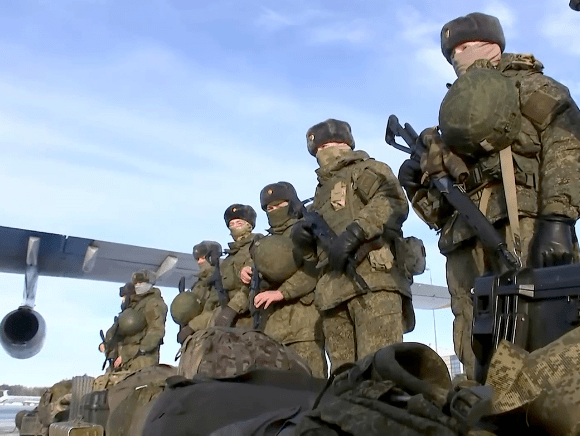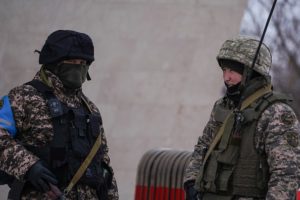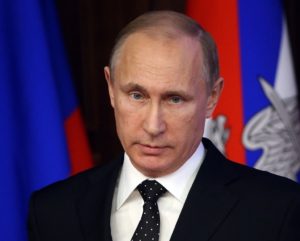When a president gives shoot-to-kill orders to put down protests by his citizens, as the Russian-backed president of Kazakhstan, Kassym-Jomart Tokayev did recently, it should give the Biden foreign policy team pause. According to Reuters, Tokayev “blamed foreign-trained terrorists for the unrest” in Kazakhstan’s major city, Almaty. So, to crush the rioters responsible for the “unrest,” the Kazakh president “said he ordered his troops to shoot to kill to put down the countrywide uprising.” But the Moscow puppet shouldn’t worry; help has arrived. Russia’s President Vladimir Putin has sent paratroopers to secure the Kazakh city’s airport. With the insertion of the Kremlin’s military force, should the U.S. be worried that Moscow is, again, sending out tentacles to gather in the former Soviet Union?
Attempting to sort out the mess that is an uprising in Kazakhstan, Dan Bilefsky, writing for The New York Times, explains, “Protests in Kazakhstan incited by anger over surging fuel prices have intensified into something more combustible and bloody.” The consequences of the Kazakh government’s efforts to quell the rioting where numerous buildings in Almaty have been burned resulted in a “Russia-led military intervention and the killing of dozens of anti-government demonstrators. Hundreds more have been injured.”
Roots of Unrest
The beef the Kazakhs initially had with their government was over the removal of the price cap on liquid petroleum gas or LPG used in many cars. In a country where the primary source of revenue is petroleum, and LPG is a major product, the Kazakhstan citizenry was angry when prices soared after the government-imposed ceiling was taken off. But that’s not the only gripe. As Bilefsky explained, “the protests have deep-seated roots, including anger at social and economic disparities, aggravated by a raging pandemic, as well the lack of real democracy.” With an average monthly income of around $580, any rise in the cost of living would be painful. But many countries around the world experience desperate economic and political circumstances. So why would the U.S. worry about Kazakhstan?
A couple of reasons come to mind. Again, from Bilefsky, “The intervention by the Collective Security Treaty Organization (CSTO), a Russian version of NATO, is the first time that its protection clause has been invoked, a move that could potentially have sweeping consequences for geopolitics in the region.” As the Kremlin has done in the past, occupying Kazakhstan under the guise of “peacekeeping” and protecting the wellbeing of ethnic Russians – around 20% of the population – would not be surprising. The uprising in Kazakhstan would not be the first challenge to governments that Moscow has sponsored to retain influence in a former Soviet bloc country. And it would be characteristic of the Kremlin to intervene when authoritarian leaders face pro-democracy forces, as was the case in other Cold War vassals of the old Soviet Union.
Associated Press Jim Heintz wrote that the “CSTO’s general secretary, Stanislav Zas, told Russia’s RIA-Novosti news agency that the full contingent to be sent as peacekeepers would number about 2,500.” Zas rejected the idea that the troops would become occupiers as “complete stupidity.” But, as in the cases of the Donbas region of Ukraine, now controlled by Russian-backed separatists, and the illegal annexation of Crimea in 2014, the notion of “complete stupidity” turned into indisputable “reality.”
White House Response
According to Heintz, when Jen Psaki, White House press secretary, was asked what the Biden administration thought about the movement of Russian troops into Kazakhstan, she replied “The world will, of course, be watching for any violation of human rights and actions that may lay the predicate for the seizure of Kazakh institutions.” Then, addressing the request by the Kazakh government for the presence of Russian combat forces, Psaki said the White House has “questions about the nature of this request and whether it was a legitimate invitation or not.”
However, more than just watching Putin exert influence over another former USSR bloc country, the United States, as is so often the case, has a financial interest. As Bilefsky notes, Kazakhstan is necessary for “American energy concerns, with Exxon Mobil and Chevron having invested tens of billions in western Kazakhstan.” Whether the economic investment by U.S. oil companies would be or should be motivation for Biden and his foreign policy gurus to get more involved is an open question.
The unrest in Kazakhstan may be one of those times where America’s chief executive might take a seat in the grandstand and watch how things unfold. There doesn’t seem to be an opening for bolder diplomatic intervention.
The views expressed are those of the author and not of any other affiliation.
~ Read more from Dave Patterson.






